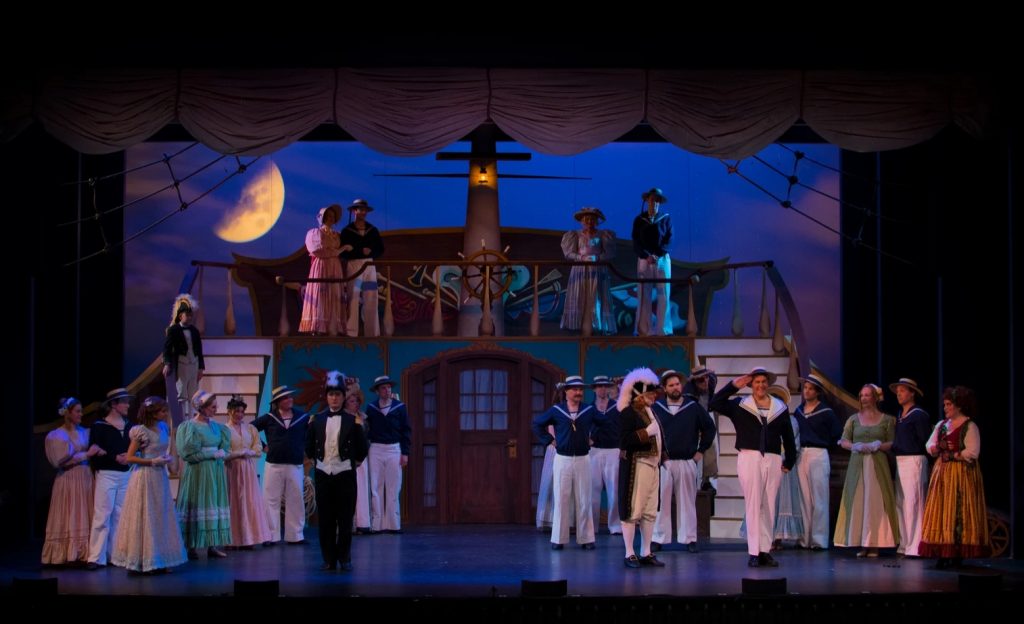by Daniel Hathaway

The launching of Camelot will be followed by opening performances of Frank Loesser’s How to Succeed in Business Without Really Trying (1961) on June 15, Vincent Youmans’ No, No, Nanette (1925) on June 22, Gilbert & Sullivan’s H.M.S. Pinafore (1878) on June 29, Emmerich Kálmán’s Arizona Lady (1954) on July 6, and Jacques Offenbach’s Orpheus in the Underworld (1858) on July 13 — all on Thursdays at 2pm.
Once each title has been rolled out, all six shows will be running “in repertory” during the last three weeks in July. That means you could spend a week at the Festival and see all of them in rotation — a type of binge watching to which some OLO devotees are addicted, and for which Wooster lodging and restaurant packages are available.
I caught up with artistic director Steven Daigle by phone to ask him what personally excites him about the coming season, which will be his 33rd with the company.
“Several things. One is just the fact that we’re doing live theater again. COVID has made all of us realize how incredibly special it is to be experiencing a production in that moment with that audience. No other theater is doing it in the same way we are. It’s like a special communion. Another is just the variety we’re offering, even among the first three musicals this season.
Although the pandemic had its effect on attendance the last two summers, Daigle said that auguries are looking good for the future. “COVID has changed things a bit, but not so much that we have to think differently about our mission or what we’re trying to achieve.”
OLO has historically attracted an older audience, but the company’s demographics are changing. “If we look at the last eight years to ten years, we’ve been attracting younger people, and we want to keep that movement going forward. I think the musicals have been a big attraction,” Daigle said. “Even though we do Golden Age and early lyric titles, the word “Musical” is enough to attract a group of curious young audience members who want to come see a show because musical theater is in their bones.”
Daigle also believes that the variety of musicals OLO offers is its own attraction. “The first three shows we’re doing are so incredibly different. Camelot is an iconic piece and while it’s been criticized for its lack of toe-tapping numbers, that’s exactly why it was so successful. At the time it was not the norm. It became successful because it was a vehicle piece for certain artists at the time, but it’s had a great tradition in our company. It was the first musical we ever did. We’ve performed it about every 10 years and the appeal seems great for it.
“How to Succeed gives us a feel for the musical idiom of the 60s, and I think that there’s a nostalgia for that style of musical,” Daigle said. “But it’s a dance ensemble piece, unlike Camelot. And No, No, Nanette is very much like the Princess Theater Shows of the Jerome Kern era, but a little later. For us, it also represents one of those pieces that we have taken some time and labor to return to its original form. Just to give you a little bit of background, it was unusual in that it had three successful productions touring throughout the United States that were not just tryouts before the show opened on Broadway.
“There are letters that indicate that the producers were afraid of pulling the cast from these tours because they felt like it could not then have a successful run on Broadway. It was making money, and it also had a London premiere at the time. But then the orchestrations were lost. There was a 1970s version that came out that reorchestrated and revised it, and we were able to find the original orchestrations in a special collection in the University of Texas at Austin. I personally went down and scanned all the material to try to reassemble what was the original — kind of a hybrid of two productions,“ Daigle said.
“I think that doing these historical works is in keeping with our mission, and it’s something that excites me. I’ve talked about the music of How to Succeed, how it identifies a period. Well, No, no, Nanette is definitely 1920s, so it’s a different dance style. We’re thinking that we will probably have the full cast tap dancing at one point in a production number.
Daigle noted that H.M.S Pinafore is a standard for a company like OLO that started out as a Gilbert & Sullivan troupe. “It’s always exciting to bring people in and have them experience working on a show like that for the first time. They become fans and begin to understand that there’s a very close relationship to the musicals as well.”
And then there’s Emmerich Kalman’s Arizona Lady, a radio show that never had a live production during the composer’s lifetime. “I did the English translation of that script and score, so I’ve been a part of that,” Daigle said. “It’s obviously a rare work — a Hungarian composer writing an operetta set in Arizona.”
I wondered if this is sounding a bit like what’s been going on with The Cleveland Orchestra recently with Puccini’s The Girl of the Golden West.
“Right,’ Daigle said. “Just as in that show, you hear a lot of influences in Arizona Lady that don’t necessarily sound like Americana, although I think Kálmán does a good job of fusing his style with an American idiom. And of course, the 50s when this came out, was the era of the American Western in which the cowboy and who the cowboy was got commercialized, and I think that Kálmán has captured that.”
And then there’s Offenbach’s Orpheus in the Underworld. “It’s where Operetta started and we’re having a lot of fun with musical rehearsals,” Daigle said. This is one of those pieces where more classically trained cast members can enjoy seeing the fusion of classical music and opera lampooned in the way that only Offenbach can do it. So I’m throwing out an overview, but those are just a few things I’m really excited about for this season.”
We’ll hear more from Steven Daigle next week about OLO’s six shows, and meet two essential members of his production team: music director Michael Borowitz, and multi-talented choreographer, director, singer, and dancer Spencer Reese.
Published on ClevelandClassical.com June 1, 2023.
Click here for a printable copy of this article




